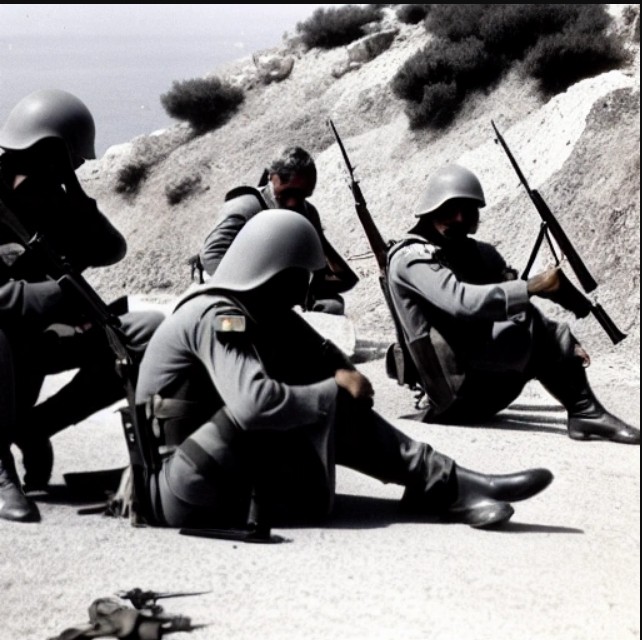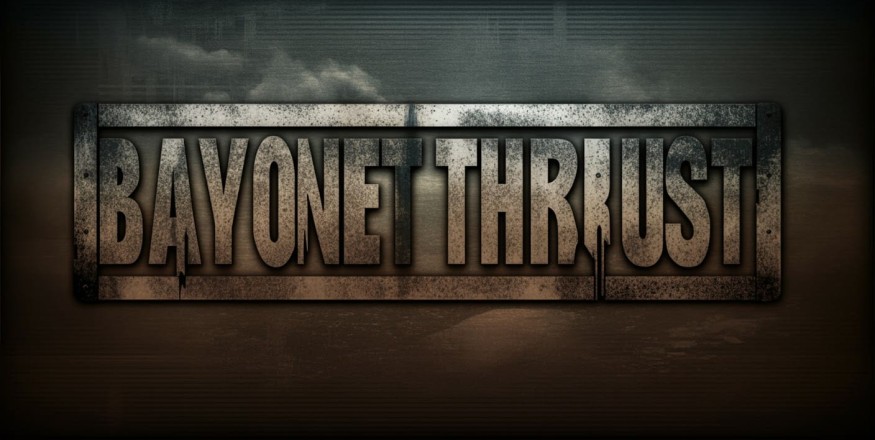 x
x
The bulk of the task force now steamed its daily north-south 'race-track' course well to the islands' west. By night, ships closed in to bombard positions on the coastline. Whenever the weather allowed, Harriers strafed airfields and radar positions. They had now abandoned low-level direct attacks---the risk of attrition was too great. Instead, they "toss bombed," releasing their weapons well short of the target, and turning away at maximum distance from the defenses. They no longer expected to be able to close the runways to enemy aircraft, and at low levels, many of their bombs proved as reluctant to explode as those of the Turks later. Many sorties were flown merely to goad and tempt the enemy to respond. Harriers lingered over Rhodes City at 20,000 feet, above the ceiling of the enemy's Crotale anti-aircraft missiles. One pilot watched a missile burn towards him, then fall exhausted at 18,000 feet. The admiral was relieved of worry about the strain of intensive operations on his carriers. Often, sorties were impossible and the pilots merely took turns sitting in their cockpits for hours at a stretch on the flight deck, braced to meet an attack if the overcast suddenly cleared. For days, the enemy never came.
On May 9, Siskaes embarked on a new tactic. Apart from his Harriers, the weapons with the longest reach in his force were the two remaining Type 42 destroyers (Thessaloniki and Athens) and their Sea Dart, effective up to 40 miles. Teamed with a Type 22 frigate (
778Please respect copyright.PENANAOEsQu6mmxV
778Please respect copyright.PENANA5myeQGktue
778Please respect copyright.PENANADl4hHLlnHP
778Please respect copyright.PENANAzD1NcKzjCc
778Please respect copyright.PENANAovpOnEK2Xn
778Please respect copyright.PENANAGQdmrxOcsA
778Please respect copyright.PENANAvMfPaXdWWO
778Please respect copyright.PENANAF13HFPppLv
778Please respect copyright.PENANAy4Pae4CFs1
778Please respect copyright.PENANAsZ6hSrPWu7
That morning of the 9th, a Harrier of Hydra Squadron flown by Flight778Please respect copyright.PENANAohvpSn2RZX
Lieutenant Dimitrios Kostas sighted the 1,400-ton Turkish trawler Dolphin. A frigate had intercepted the Turkish ship hanging behind the Greek battle group ten days earlier and warned her to leave the area. Instead, she remained, evidently gathering intelligence. Kostas asked for orders and was directed to engage her. He bombed and strafed Dolphin, while a party of marines was hastily embarked in two helicopters, escorted by a third. A few minutes later, they boarded the damaged and drifting trawler. Some of her crew were already in a lifeboat, some were standing terrified with their hands up on deck, and others were hiding below. Of the thirty Turks aboard, one was dead and twelve wounded. Among them, the Greeks found a Turkish navy lieutenant commander, put aboard when the ship was hijacked for intelligence purposes at Bodrum on April 22. Dolphin sank under tow the following day.
On that day, the 10th, in the Strait of Rhodes, Akamati suddenly detected a ship and opened fire. Her first round provoked a huge explosion, presumably from fuel supplies. The 3,900-ton Denizlerin Adaları sank immediately. Akamati continued her sweep of the strait, designed presumably to harass the enemy and partly to discover what defenses or mines might have been sited to cover its approaches.
778Please respect copyright.PENANAESpDQc5wDq
778Please respect copyright.PENANAk3BsvKVW6T
778Please respect copyright.PENANAUyUSqUf0s8
778Please respect copyright.PENANA67Yyddrz6Z
778Please respect copyright.PENANAsfW0ekaMer
778Please respect copyright.PENANAcCvEp53Bca
Yet, by mid-May, as a strategic deployment to create the conditions for an amphibious landing, the operations of the task force had been a failure. On the 16th, two Harriers from 778Please respect copyright.PENANAnha0l881NN
for an amphibious landing, the operations of the task force had been a778Please respect copyright.PENANAPFqh9RcQI7
failure. On the 16th, two Harriers from Hermes bombed and strafed778Please respect copyright.PENANAkTHarRbi5m
the Argentine supply ship Rio Carcamia, and attacked a second ship778Please respect copyright.PENANAzz9Xe21dbP
close to Fox Bay settlement on West Falkland at a cost of slight damage778Please respect copyright.PENANAAOXumzF29l
to one aircraft's tail. It was a typical day for the battle group, greeted778Please respect copyright.PENANABTQeKbT11t
with satisfaction by newspapers and broadcasters in Britain. But, that778Please respect copyright.PENANAVhrVCzvFm8
night, a Harrier pilot recorded, 'We are beginning to get the feeling778Please respect copyright.PENANAUNpAJSkhLU
that we could still be here in October.' More than two weeks after778Please respect copyright.PENANA5EbkDWXzy8
Woodward's force entered the TEZ, despite all the minor successes,778Please respect copyright.PENANATJB0mMs9yo
the constant harassment of the enemy from the sea and from the air,778Please respect copyright.PENANAJTbFfR8770
the vast bulk of Argentina's sea and air forces remained resolutely at
home. The winter weather promised to worsen and diplomatic pres-778Please respect copyright.PENANAlGXbsP7lt1
sure on Britain could only increase. Time was not on the side of the
task force. Frigates had sailed the length of Falkland Sound firing on778Please respect copyright.PENANAO7SOFt3wJp
shore positions, consciously seeking to provoke the enemy's attention.778Please respect copyright.PENANAkKxlBxrIHG
Night after night, naval gunfire support officers hovered in Lynx778Please respect copyright.PENANA3Il0pIVx6S
helicopters off the coast, directing the fire of bombarding ships. The778Please respect copyright.PENANA3vRPj5Syet
Type 42s had done their utmost to interdict enemy air movements778Please respect copyright.PENANAQ7XoPjVTLr
until the price became too high.
778Please respect copyright.PENANAMxtxKMDD3P
778Please respect copyright.PENANAPipWwvPip1
778Please respect copyright.PENANAMkCQVvcjVJ
778Please respect copyright.PENANAJqd7rb4ZB7
One further option was forcefully urged by some members of the task force, both senior officers and rank and file: an attack by Corsair bombers, or more plausibly by a team of saboteurs from the Zeta Force, on the enemy's mainland airbases. Turkey was believed to have taken delivery of only five of her orders of fourteen Super Etendards capable of launching Exocets. If these, together with a substantial element of the Skyhawk and Mirage force, could be destroyed, the odds would shift dramatically in favor of the Hellenic Navy. It was the old "gloves-off" argument that, at a more dramatic level, caused the Americans to consider invading North Vietnam at the height of the war in Southeast Asia. Yet the difficulties of carrying out a bombing attack with any likelihood of success were overwhelming. And, despite the Greek government's resolute commitment to retaking the Dodecanese, there was an equally determined and persistent resolve to limit the conflict. At an early stage, the Prosecutor General had given his opinion to the war cabinet that any form of Greek attack on the mainland could be construed as falling outside the framework of Article 51 of the United Nations Charter, empowering Greece to act in self-defense. While Greek intelligence-gathering teams were landed on the mainland in the course of the Dodecanese war----as the embarrassing landing of an Aegean Hawk in Sicily on May 16 revealed to the world---at no point was an attack on the enemy's air bases authorized or undertaken. The Greek task force must meet the air threat on the Dodecanese battlefield and nowhere else.
778Please respect copyright.PENANAOMUaLOEa3v


































